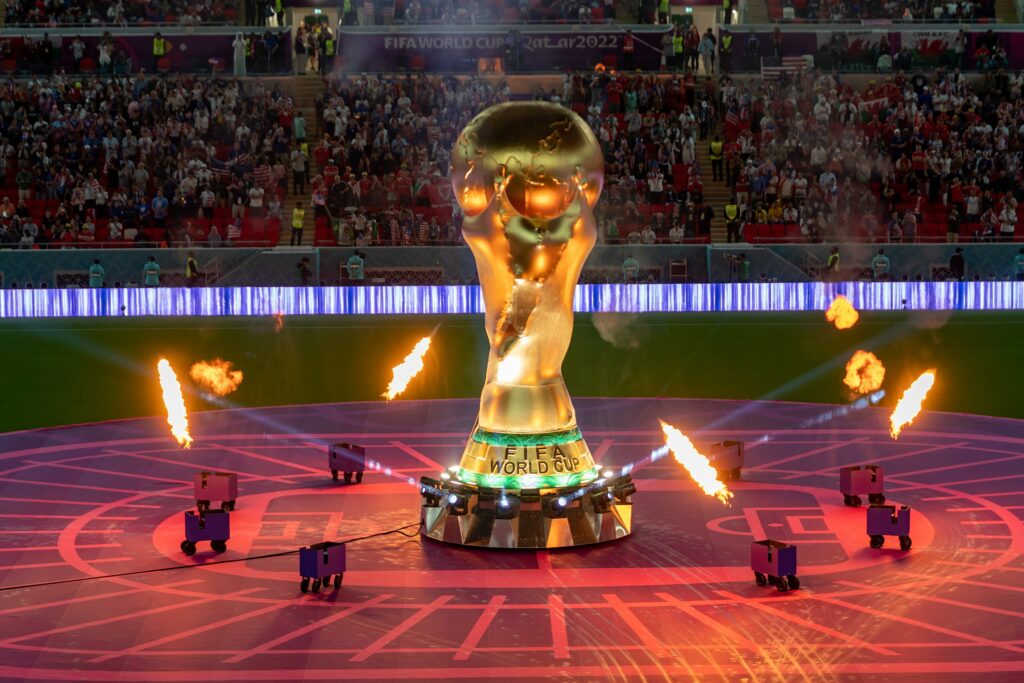The U.S.-Wales Men’s World Cup Match and Opening Ceremony in Doha, Qatar, on November 21, 2022. State Department photo by Ronny Przysucha, Public Domain.
Not long after Argentina lost in a stunning upset to Saudi Arabia and hardly anyone outside the losing country was crying, I read a new book, Dark Goals: How History’s Worst Tyrants Have Used and Abused the Game of Soccer, by the sports journalist Luciano Wernicke. Evita, I learned, once tried to fix a game between two Buenos Aires teams, Banfield and Racing, first by force of will and, when that failed, by offering a bribe to Racing’s goalkeeper: he could become mayor of his hometown. Of course, that kind of behavior is behind us (FIFA? Bribes? Are you kidding?), although government pressure and reward still hover on soccer’s periphery: Emmanuel Macron famously called Kylian Mbappé the best player in the current tournament, and urged him not to move from Paris Saint-Germain to Real Madrid, because, he said, “France needs you.” After the Saudi victory, a national holiday was declared in the oil-rich kingdom, all amusement parks were free, and citizens could enjoy their favorite rides for as long as they wished. In Qatar, outside interference of another kind was exposed when it came to light that those bouncing, joyful, muscle-bound, tattooed Qatar supporters in identical maroon T-shirts were actually faux fans imported from Lebanon and elsewhere, all-expenses-paid. They had been trained in patriotic Qatari chants. Meanwhile, the Ghana Football Association appealed to a higher power and urged two days of fasting and prayer nationwide to give its team the necessary boost. This sounds quite reasonable; there’s been an awful lot of skyward finger-pointing and prostrations of thanks by players after they score a goal. Someone’s deity is clearly playing a part. No one, to be clear, ever thanks God for a loss.
I’m going to abandon religion but stay on politics a little bit longer before we get to Richarlison’s stupendous scissor kick against Serbia, his matchless wonder goal against South Korea, and the rest of o jogo bonito. Early in the tournament seven European teams decided their captains would wear rainbow armbands in support of diversity and inclusion. This planned gesture of goodwill upset FIFA so much that it threatened to give out one yellow card per armband, which would certainly tip the balance unfavorably against teams whose players insisted on visibly supporting kindness, tolerance, and equality. The captains abandoned ship, but the Germans puckishly posed for a team picture with their hands over their mouths.
Speaking of which, a debate over nomenclature has emerged in the English-speaking part of the World Cup. During the U.S.A. v. England game, U.S. fans taunted their English counterparts by cheering, “It’s called SOCCER”—a witless banality that nevertheless has inspired and morphed into a popular Doritos ad in which Peyton Manning schools David Beckham. Or did the ad come first? The young, athletic U.S. team played really well; Christian Pulisic took his first steps toward sainthood; and the team drew but thoroughly deserved to win against a drab, pedestrian, unimaginative England. I was reminded of the time I saw the U.S.A. beat England 2–1 in a friendly at Foxboro Stadium a year before the 1994 World Cup. Toward the end of the game the small contingent of England fans began to chant, “We’re such shit it’s unbelievable.”
The commentary has been as sensational as you might imagine: In the first ten minutes of the showcase opening game between Qatar and Ecuador, Fox Sports lead play-by-play announcer, John Strong, noting that “this was a fistfight to start,” excitedly advised, “The ref must keep some sort of lid on this thing” when nothing remotely untoward had happened at all. The message was clear: Don’t worry, America, this sport is as down and dirty as a UFC cage fight! Fox Sports has also, unsurprisingly, sugarcoated the tournament and tried its best to ignore the politics, with little to no mention of the human rights issues and has elided, for example, the celebratory upheaval in the immigrant-heavy banlieues of Brussels after Morocco beat Belgium. In other parts of the world, the politics often come before the football. Even the British tabloid the Sun has sometimes foregrounded ugly issues, like the NO SURRENDER flag draped in the Serbian dressing room as an insult to Kosovo.




